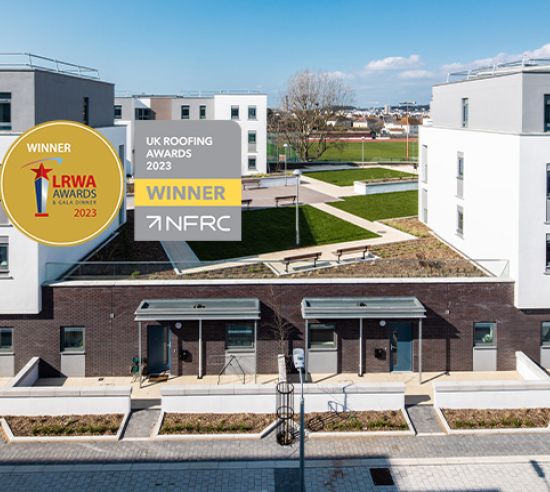The challenge
In November 2019, Triflex were invited to provide a project specification proposal for a number of sheltered stairs and landings in 30 separate apartment blocks at Heath Town, Wolverhampton.
The client required an economical, anti-skid surfacing solution to the walkways, stairwells and landings to increase safety. The existing substrate consisted of structural concrete which was either new or had undergone substantial repairs. In areas it had been previously overcoated with an unknown coating system, which was deemed unsatisfactory by the client.
Triflex Authorised Contractors, Churchill Specialist Contracting Ltd, conducted a sample trial in order to ensure adhesion and to determine whether a primer was necessary. It is essential to carry out adhesion tests on a case by case basis, as even minor differences in the substrate can impact the outcome. These tests are designed to confirm the required preparation, pretreatment and priming method, although in many cases all that is required is a simple clean before applying the Triflex system.
The test confirmed that pre-treatment and primers would not be necessary. The Triflex sample was compared with a competitor equivalent solution, it was overwhelmingly clear that the Triflex solution was much thicker and of better quality, offering superior adhesion to the substrate.
One significant challenge of projects like this is being able to carefully manage the access requirements of the tenants of the apartment blocks while the installation takes place. Triflex resins are solvent and isocyanate free, and therefore not harmful. However, at times it would be necessary to restrict direct access to the installation area until the solution had fully cured. Fortunately, Triflex PMMA waterproofing systems are extremely rapid curing, and Triflex StairCoat Eco is no exception. This would allow buildings to remain occupied during installation, limiting unnecessary disruptions to everyday life. Installation can be carried out all year round, curing to become trafficable in 1 hour even temperatures down to 0°C.
The solution
Following the success of the trial sample, the specified system was Triflex StairCoat Eco. Triflex StairCoat Eco met the brief perfectly, this anti-slip surfacing system is incredibly economical to install and can provide a low slip potential when paired with our Quartz Design finish. The ultra-rapid and low temperature curing meant that disruptions to residents would be kept to an absolute minimum. This system build-up had been trialed on car parks in Germany and this satisfied the clients requirements for the anticipated levels of traffic and wear and tear associated with social housing.
It is critical to provide a safe and secure antiskid environment on stairwells, and thanks to a combination our highly durable, low-slip potential surfacing on the treads and fabricated or resin based edge nosings, Triflex StairCoat Eco is the cost effective answer. Finished with a choice of either large grain or small grain anti-skid quartz and a durable coloured finish that is available in over 50 standard colours, provides end users with a great deal of choice.
The build-up consists of Triflex Cryl Primer 276 for cementitious substrates, Triflex Cryl Finish 209 with quartz, and finally a further layer of Triflex Cryl Finish 209 to encapsulate the quartz. The client chose the Quartz Design finish with small grain quartz, making the system ideal for light foot traffic by providing increased anti-skid properties, and metal nosings for the stairs to provide enhanced safety and security.
Due to the installation being in internal areas there was a potential challenge with providing sufficient air circulation. Triflex PMMA resins are reliant on air movement to cure and it is necessary to provide a minimum of 7 air changes per hour in the work area. This generally occurs naturally in external areas, but often requires intervention indoors. However, this is easily solved by the use of in/ out fans pulling fresh air into the building, whilst another fan sucks the stale air out.
Due to the rapid curing ability of Triflex materials, and its suitability to be installed in low temperatures without extending cure times, Churchill Specialist Contracting Ltd were able to commence on-site works on 10th November 2019, with the initial phase of works completed by 9th December 2019. The subsequent phases are currently on-going.



















